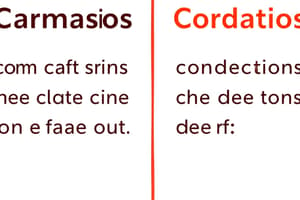Podcast
Questions and Answers
The structure of the Zero Conditional is If + present simple, ______ simple.
The structure of the Zero Conditional is If + present simple, ______ simple.
present
The First Conditional is used to talk about real and possible ______ in the future.
The First Conditional is used to talk about real and possible ______ in the future.
situations
In the Second Conditional, the structure is If + past simple, ______ + base verb.
In the Second Conditional, the structure is If + past simple, ______ + base verb.
would
The Third Conditional uses If + past perfect, ______ + past participle.
The Third Conditional uses If + past perfect, ______ + past participle.
Mixed Conditionals combine elements from the ______ and third conditionals.
Mixed Conditionals combine elements from the ______ and third conditionals.
In formal writing, you can use inversion, such as ______ I known instead of If I had known.
In formal writing, you can use inversion, such as ______ I known instead of If I had known.
You can replace 'would' with 'might' or 'could' in some contexts for varying degrees of ______.
You can replace 'would' with 'might' or 'could' in some contexts for varying degrees of ______.
Common errors include mixing up verb ______ or incorrectly forming the conditional structure.
Common errors include mixing up verb ______ or incorrectly forming the conditional structure.
Flashcards are hidden until you start studying
Study Notes
Definition
- If Conditionals: Sentences that express a condition and a result, often structured as "If + condition, result."
Types of If Conditionals
-
Zero Conditional
- Structure: If + present simple, present simple
- Use: To express general truths or scientific facts.
- Example: If you heat water to 100 degrees Celsius, it boils.
-
First Conditional
- Structure: If + present simple, will + base verb
- Use: To talk about real and possible situations in the future.
- Example: If it rains tomorrow, I will stay home.
-
Second Conditional
- Structure: If + past simple, would + base verb
- Use: To discuss hypothetical or unlikely situations in the present or future.
- Example: If I had a million dollars, I would travel the world.
-
Third Conditional
- Structure: If + past perfect, would have + past participle
- Use: To talk about hypothetical situations in the past that did not happen.
- Example: If I had known about the meeting, I would have attended.
Mixed Conditionals
- Combines elements from second and third conditionals.
- Structure: If + past perfect, would + base verb
- Use: To express a past condition with a present result.
- Example: If I had studied harder, I would be in university now.
Key Points
- Punctuation: Use a comma between clauses if "if" clause comes first.
- Inversion: In formal writing, "Had I known..." instead of "If I had known..."
- Substitutes: "Unless" can replace "if not."
- Modal Verbs: Can replace "would" with "might" or "could" in some contexts for varying degrees of certainty.
Common Errors
- Mixing up verb tenses (e.g., using present instead of past).
- Incorrectly forming the conditional structure.
- Forgetting that the result can sometimes come before the "if" clause (e.g., "I would stay home if it rained.").
If Conditionals
- Define If Conditionals as sentences expressing a condition and a result, structured as "If + condition, result."
Types of If Conditionals
-
Zero Conditional:
- Structure: "If + present simple, present simple."
- Used for general truths or scientific facts.
- Example: Water boils at 100 degrees Celsius when heated.
-
First Conditional:
- Structure: "If + present simple, will + base verb."
- Used for real and possible future situations.
- Example: Rain tomorrow means staying home.
-
Second Conditional:
- Structure: "If + past simple, would + base verb."
- Used for hypothetical or unlikely present or future situations.
- Example: With a million dollars, traveling the world is envisioned.
-
Third Conditional:
- Structure: "If + past perfect, would have + past participle."
- Used for hypothetical past situations that did not occur.
- Example: Not knowing about the meeting led to absence.
Mixed Conditionals
- Combines elements of second and third conditionals.
- Structure: "If + past perfect, would + base verb."
- Used for expressing a past condition leading to a present result.
- Example: Studying harder could have resulted in university attendance now.
Key Points
- Punctuation: Always use a comma if the "if" clause is in the sentence's first part.
- Inversion: Consider formal writing where "Had I known..." replaces "If I had known..."
- Substitutes: "Unless" can effectively replace "if not" in sentences.
- Modal Verbs: "Would" can be replaced with "might" or "could" to depict different certainty levels.
Common Errors
- Avoid mixing verb tenses, such as inserting present where past is needed.
- Ensure correct formation of conditional structures.
- Remember that results can precede the "if" clause, e.g., "I would stay home if it rained."
Studying That Suits You
Use AI to generate personalized quizzes and flashcards to suit your learning preferences.




